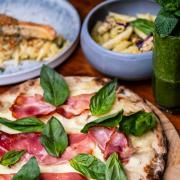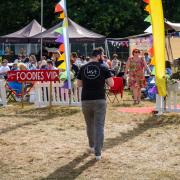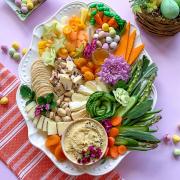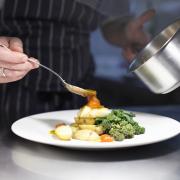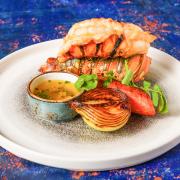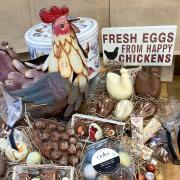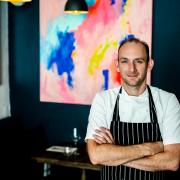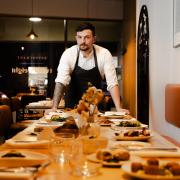We’ll tuck into Christmas dinner after a summer of uncertainty over where our meat comes from. Cheshire Wildlife Trust however, can trace every hoof-print of their native herds, and now we can all taste the difference
For most of us, the table on December 25 will be adorned with a crisply steaming turkey, chicken or goose. With its basted wings and stuffing, such a choice leaves little doubt or confusion over what will be accompanying our roast potatoes and Brussell sprouts (whether you enjoy them or not).
Earlier this year however, the world of processed meat production, distribution and marketing was brought into sharp focus as some of our leading supermarkets were found to be mislabelling staples like beef lasagne and spaghetti bolognese, when in fact they contained other products, including horsemeat.
Whether you lay the blame at the door of the abattoir, the supplier or those putting the meat on the shelves, the scandal demonstrated that we often know worryingly little about the journey of our meat from field to plate.
Back in 2006, Cheshire Wildlife Trust moved from its long-time headquarters at Reaseheath near Nantwich to a 200 acre farm on the Cholmondeley Estate in south Cheshire. The reason? A new home for ever-growing herds of traditional native breed cattle and sheep.
The herds – in the case of the Longhorns, probably the third largest in the UK – were to become the Trust’s ‘living lawnmowers’, an almost 100 per cent natural way of managing wildflower meadows, heathlands and peatbogs for the benefit of wildlife.
Munching their way through unwanted plant species, churning up the ground to the delight of beetles, other insects and birds, and allowing fragile native plants to flourish was the raison d’être for the new four-legged staff. The choice of ‘horned’ breeds was no accident too, with the Trust aware that anti-social behaviour may pose a threat on publicly accessible sites. Despite appearances though, the largest in the herd, the Longhorns, remain one of the most docile and approachable breeds.
As the popularity of this natural habitat management method grew, so the herds expanded, travelling across the North West to lend a hand at the RSPB’s flagship Cheshire nature reserve at Burton Mere Wetlands and on up the M6 to the award-winning floating visitor centre at Brockholes in Lancashire. From modest meadows in Whitchurch to the banks of the Mersey and beside the M56, the Trust’s cattle and sheep were becoming familiar faces across the region.
With the constant expansion of the project came a need to ensure the long-term viability of the scheme, not least when over a quarter of the Trust’s 45-strong nature reserves network rely on the Longhorns, Dexters or Hebrideans to maintain them for wildlife.
With cattle and sheep a little harder to garner support for than a cuddly dormouse or otter, the Trust tentatively embarked on releasing a small amount of meat from the herds to the commercial market. Although not certified organic, the traceability and provenance of the herds grazed on local nature reserves meant that consumers were being treated to an almost completely chemical-free product, with proven Omega 3 health benefits to match.
A further 2012 funding boost from the Big Lottery through the Local Food initiative, saw the Trust launch their ‘Wild About Conservation Meat’ scheme. Although the conservation need for the cattle remains at the heart of the scheme, the charity also saw moving into the commercial meat market as an important step in helping to secure the project’s future, especially as with breeding herds there was an ongoing supply of steers and lambs beyond that required to maintain the desired herd size.
In parallel with the commercial venture, the Trust has also taken the project out on the road, visiting audiences as varied as inner-city schools and county shows – with a Longhorn cow in tow – helping to bring the story of our meat directly to the ready-meal generation. Healthy eating has also been a cornerstone to the project, with dozens of youngsters given the opportunity to cook with the ‘Wild About Conservation Meat’ team.
Although the summer horsemeat scandal raised concerns over the provenance of our meat, welfare and care of livestock is an increasing priority for consumers. To this end, the Trust has specifically targeted experienced meat processors, helping to reduce the trip from field to abattoir to just 15 miles in some cases.
Using specialist butchers with knowledge in preparing native-breeds for market means the Trust and their customers can be confident that these important animals are subjected to as little stress and anxiety as possible on their final journey.
With limited resources for over-the-counter retail at their Bickley Hall Farm HQ, the Trust has been ambitious in its aims to promote conservation-grazed meat and has decided to move into the wholesale market from the beginning.
This has already seen beef and lamb made available from Macclesfield to the Wirral, in outlets ranging from popular restaurants to local town food-box schemes. Those local to the Trust’s HQ near Malpas can also pre-order ‘beef boxes’ to collect.
A minimum 21 days hanging and celebrity chefs like Heston Blumenthal commenting that ‘the Longhorn has it all’, means the Trust believes they are offering a genuine premium product as project officer Heather Hulse explains: ‘It’s important our meat is showcased by chefs whose final dishes match the care and investment we’ve made in these animals. You can’t encourage the public to eat high quality, traditionally-raised meat if it’s poorly cooked or presented.’
For now, the emphasis is on growing the scheme and sharing its success with other county Wildlife Trusts across the UK, including the potential for a widely recognised quality marque and brand.
Heather added: ‘We’ve developed a simple logo that encompasses the whole story of our nature-grazed meat and it would be a real achievement to see something similar rolled out across the country with our partner Trusts, giving customers and wholesalers alike the peace of the mind that already comes from established schemes like Red Tractor.’
Whatever the future holds for the Trust’s scheme, whether it be engaging local communities in understanding the story of our meat, or seeing the finest cuts of Cheshire-raised Longhorn on more restaurant menus, the team is confident that people will be want to enjoy something that is ‘better by nature’ – in every possible way.
A taste of nature
Selected cuts of Cheshire Wildlife Trust’s conservation-grazed beef and lamb are available direct from Bickley Hall Farm (SY14 8EF) from Monday-Friday, but please call ahead on 01948 820728 to check availability. ‘Beef Boxes’ from around £36 can also be pre-ordered from the Trust by contacting Joe or Heather.
For a full list of stockists visit www.cheshirewildlifetrust.org.uk/wildmeat.










